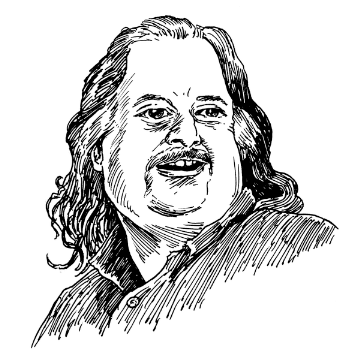Pulitzer Prize–winning restaurant critic Jonathan Gold’s soft voice gives the impression that the writer is endlessly contemplative. In conversation, he makes claims, drops names, and parses with authority the particulars of dishes native to less-traveled culinary territories as if he is still making sense of the knowledge he’s dropping, often turning statements into questions. His demeanor is subdued, sometimes brutally deadpan, although he shakes with mirth when he has been especially funny.
In documenting with passion and insight the vast troves of unknown and unsung restaurants dotting Los Angeles’s sprawling patchwork of immigrant-rich communities, Gold’s prose can resemble his more animated live rants. Recommendations often take the form of sweeping imperatives that begin with “You will want” and “Of course, you will have…” Descriptions are exuberant and heavy on analogy. In his review of the Shanghainese restaurant discussed later in this interview, a dish with a name that translates to “braised three strings” is compared to Cousin It, “with a mushroom cap for a beret.” Chicken feet in abalone sauce are “as soft and juicy as a lover’s tenderest sighs.” A crab roe casserole is “suave.” Stacked up against the insipid brews turned out by many restaurant critics—the less knowledgeable, less diligent, and less poetic—Gold’s writing is a long-simmered stock of meat and bones.
Gold and I met for dinner at a modern Korean restaurant in Los Angeles’s bustling Koreatown. Before the first bottle of Hite hit the table, the waiters were exchanging furtive glances, and the freckled man with stringy, reddish hair sitting across from me was anonymous no longer. “I couldn’t be more recognizable,” he said, waving off the notion that a mesh hat, fake beard, or cape would do him much good. According to Gold, after his 2007 Pulitzer victory, the Los Angeles native was pegged in line at a taco truck in the largely Latino city of Bell Gardens. “Hey!” a man yelled, pointing and drawing the attention of all the others waiting for tacos. “You’re that guy who won that thing!”
—Andrew Simmons
I. YOU HAVE TO TALK ABOUT SALT
THE BELIEVER: When you’re reviewing a restaurant, do you take notes at the table?
JONATHAN GOLD: No. I’ve been doing this for a long time. I have good food memory.
BLVR: What does “food memory” mean, exactly?
JG: It’s complicated, but I can remember the key details of a dish that make it memorable without writing notes. There’s just something about writing notes. Eating is an essential activity. You could take notes while you’re fucking, too, but you’d lose the flow.
BLVR: Is finding new and unique ways to describe food ever a challenge?
JG: Yeah, all the time. Food words are pretty specific. If...
You have reached your article limit
Sign up for a digital subscription and continue reading all new issues, plus our entire archives, for just $1.50/month.
Already a subscriber? Sign in





